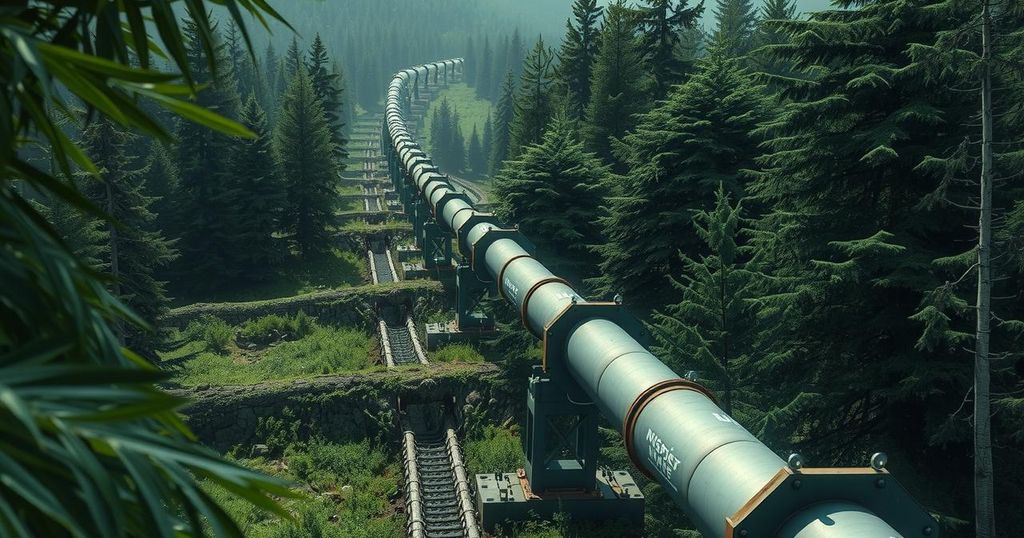Recent reports highlight a surprise attack by Russian troops using a gas pipeline in Kursk against Ukrainian forces. President Zelensky reaffirmed Ukraine’s commitment to peace ahead of meetings with U.S. officials. France plans to fund military aid using interest from frozen Russian assets, while concerns over U.S. military support to Ukraine have been raised. A Ukrainian drone strike occurred deep within Russian territory, illustrating the conflict’s persistence.
In the latest developments regarding the Ukraine-Russia conflict, Russian troops reportedly utilized a major gas pipeline to surprise Ukrainian forces in Kursk, according to pro-Russian military bloggers. This offensive is part of an effort to reclaim territory lost to Ukraine, where approximately 1,300 square kilometers were taken last year. Ukrainian President Volodymyr Zelensky expressed Ukraine’s commitment to peace and highlighted the importance of ongoing discussions with U.S. representatives in Saudi Arabia. Zelensky emphasized Ukraine’s pursuit of negotiated resolutions amidst the ongoing conflict.
Moreover, France plans to allocate €195 million in military aid to Ukraine by leveraging interest from frozen Russian assets. Armed Forces Minister Sebastien Lecornu announced that the funds would be used for critical military supplies such as 155-mm artillery shells and glide bombs intended for the Mirage 2000 fighter jets provided to Ukraine. France has committed to assisting Ukraine following an agreement among the G7 nations to finance military support through various loans.
The issue of U.S. military aid and intelligence-sharing to Ukraine emerged as a topic of concern. Chris Philp, the Shadow Home Secretary, expressed alarm over reported cuts in assistance, stating that ongoing support is crucial given recent Russian attacks on Ukrainian civilians. He emphasized the moral obligation to aid Ukraine in defending against aggression, particularly in light of the peril posed by autocrats like Vladimir Putin.
In a significant escalation, a Ukrainian drone recently struck an industrial site in Chuvashia, Russia, approximately 1,300 kilometers from the Ukrainian border, marking one of the furthest penetrations into Russia by Ukrainian forces. While regional officials reported no casualties, there were other attacks on oil refineries in the Ryazan and Lipetsk regions, showcasing the ongoing intensity of Ukrainian assaults.
In addition, former Deputy Prime Minister Lord Heseltine urged a reevaluation of Brexit concerning defense policies in light of the changing geopolitical landscape following U.S. military aid withdrawals. Latvia’s President Edgars Rinkevics advocated for European nations to increase defense spending and implement conscription, reflecting growing concerns about military readiness.
On the ground, the Russian Defense Ministry confirmed its forces had captured the village of Konstyantynopil in the Donetsk region and regained control over regions in the Sumy area, previously vacated last year. U.K. officials stressed the importance of voluntary participation from other nations in their coalition to support Ukraine, asserting that support for Ukraine is a shared international responsibility.
In summary, the ongoing Ukraine-Russia conflict continues to evolve, with recent reports highlighting Russian tactical operations utilizing gas pipelines and a significant Ukrainian drone strike that penetrated deep into Russian territory. Ukraine’s commitment to dialogue with the U.S. and France’s commitment to military support through funds derived from frozen Russian assets further underscore international efforts to bolster Ukraine’s defense capabilities. Lastly, prominent figures emphasize the critical nature of ongoing military assistance and strategic defense initiatives across Europe to address the threats posed by Russia.
Original Source: www.independent.co.uk




